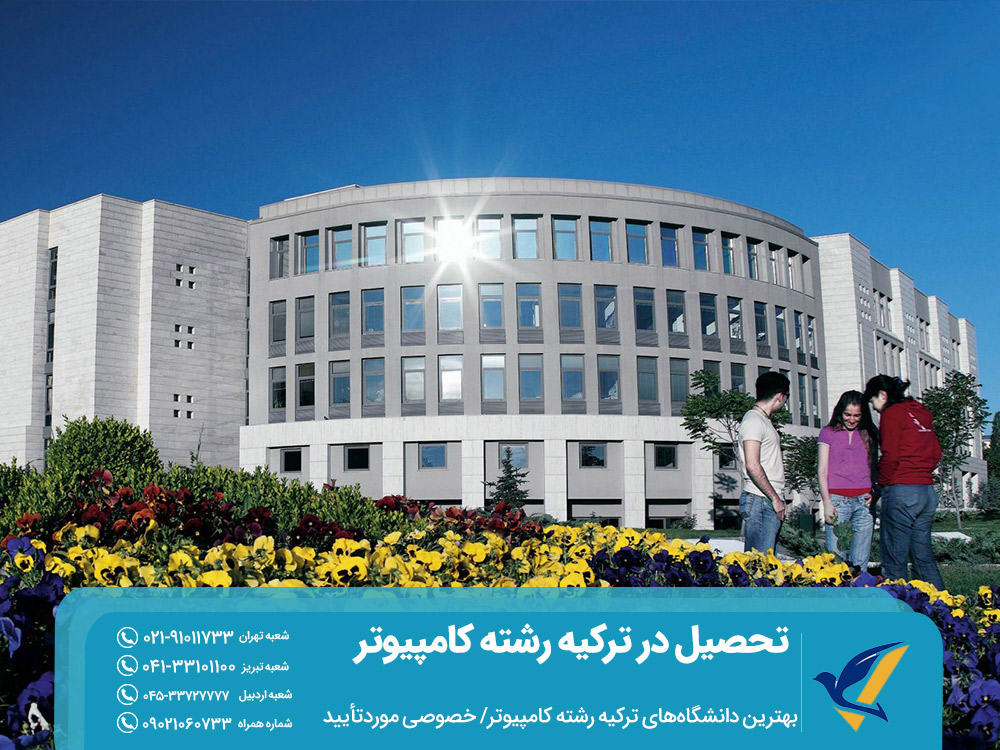Studying Computer Science in Turkey
Turkey has become a prime destination for students interested in computer science, thanks to its modern educational environment, internationally recognized standards, affordable tuition fees, and globally accredited universities. With a promising job outlook, the field of computer science offers two major disciplines: Computer Science and Computer Engineering.
Both disciplines are offered at Turkish universities and have consistently attracted undergraduate and graduate students. If you are considering studying in Turkey, this article will provide you with valuable insights into the process.
Why Study Computer Science in Turkey?
Turkish universities are among the most prestigious institutions for computer science education worldwide, boasting impressive global rankings. The engineering faculties in Turkey follow teaching methodologies that align with those of American and European universities. Additionally, they are equipped with state-of-the-art laboratories and workshops to enhance the learning experience for engineering students.
Moreover, Turkish universities serve as a gateway to further educational opportunities in Europe. Through student exchange programs such as Erasmus and the Bologna Process agreements, students have the chance to continue their studies at top European universities—often tuition-free—starting from their second year.
The cost of studying computer science in Turkey is significantly more affordable compared to other European countries. A bachelor’s degree in Computer Engineering typically takes four years to complete. The first year focuses on foundational subjects such as physics, mathematics, and computer programming, while subsequent years cover core courses and specialized applications in computer science and engineering.
Requirements for Studying Computer Science in Turkey
A bachelor’s degree in Computer Science or Computer Engineering in Turkey takes approximately 4 years (8 semesters). Mathematics forms the core structure of the program. Turkish engineering faculties offer 47 diverse programs in Computer Science and 26 programs in Software Engineering, all of which are taught according to international educational standards. As a result, applicants wishing to study Computer Science in Turkey must meet certain general requirements, including:
- Possessing high school graduation certificates and examination results from their home country, demonstrating completion of high school.
- Achieving high scores on the YÖS or SAT exams, as well as other accepted exams such as the ACT. These exam results are primarily required for admission to public and technical universities in Turkey.
- Proficiency in either Turkish or English. Applicants must submit recognized language certificates such as TOEFL or IELTS (for English) and TOMER (for Turkish), as the language of instruction in Computer Engineering programs in Turkey is typically either English or Turkish.
Documents Required for Registration in Computer Science Programs in Turkey
The specific requirements and documents needed for admission to Turkish universities are determined by the individual universities. Therefore, applicants are advised to visit the official website of their chosen university for precise information regarding eligibility and required documents. However, in general, the following documents are required to apply for a Computer Science program in Turkey:
- All identity documents
- Original and copy of passport
- Translated high school and pre-university diplomas (into Turkish or English)
- Translated academic transcripts
- Equivalent certification of educational documents
- Proof of passing one of the accepted exams, such as YÖS, SAT, ACT, etc.
- Proof of English or Turkish language proficiency, based on the language of instruction at the chosen university
- Several passport-sized photos
- Proof of tuition fee or registration payment
- Bachelor’s and master’s degree certificates (for master’s and PhD programs)
- Proof of acceptance in the ALES exam (for master’s and PhD applicants)

Best Private Universities in Turkey for Computer Science (Accredited)
Several universities in Turkey offer Computer Science programs, with 15 private institutions being officially recognized by Turkey’s Ministry of Science. However, it is important to note that the tuition fees at these private universities tend to be significantly higher. These universities include:
- Bilkent University
- Boğaziçi University
- Hacettepe University
- Koç University
- Bahçeşehir University
- Atilim University
- Istanbul Aydın University
- Istanbul Bilgi University
- Istanbul Gelisim University
- Kadir Has University
- Kocaeli University
- KTO Karatay University
- Özyeğin University
- Yeditepe University
- Çankaya University
Best Public Universities in Turkey for Computer Science (Accredited)
In Turkey, many more public universities are offering Computer Science programs that are also accredited by the Ministry of Science. These public universities tend to have lower tuition fees. The following 16 public universities are among the best options for studying Computer Science:
- Ankara University
- Çukurova University
- Dokuz Eylül University
- Ege University
- Erciyes University
- Gazi University
- Istanbul Technical University (ITU)
- Karabük University
- Marmara University
- Yıldız Technical University
- Ondokuz Mayıs University
- Selçuk University
- Akdeniz University
- Osmangazi University
- Uludağ University
- Middle East Technical University (METU)
Advantages of Studying Computer Engineering in Turkey
Studying Computer Engineering in Turkey offers numerous career opportunities both within the country and abroad. Additionally, there are several advantages associated with pursuing this degree in Turkey:
- Affordable living and tuition costs: Turkey offers a cost-effective living and studying environment, especially compared to many Western countries.
- Cultural proximity to Iran: Turkey’s culture is closely aligned with Iran’s, making it easier for Iranian students to adjust.
- No visa or financial proof requirements: Students can study in Turkey without the need for a visa or financial guarantees.
- Proximity to Iran: Turkey’s geographical location makes travel between the two countries quick and convenient.
- High job market demand: Graduates of Computer Engineering programs in Turkey have excellent job prospects with leading companies both within Turkey and abroad.
- Gateway to higher education or job markets in the U.S., Canada, and EU: Turkey provides an excellent platform for students to continue their studies or enter the job market in prestigious countries like the U.S., Canada, and EU member states.

Studying Computer Science in Turkey: Scholarships and Language Requirements
Scholarships for Computer Science in Turkey
One of the most prominent ways to secure a scholarship for studying Computer Science in Turkey is through the Turkiye Burslari scholarship program. This scholarship is highly competitive, and registration usually begins on December 20th and runs until February 1st each year. The results of the scholarship selection process are announced in late August.
Receiving the Turkiye Burslari scholarship significantly reduces the costs associated with studying Computer Science in Turkey.
Key eligibility requirements for the scholarship at the undergraduate level include:
- Age below 21.
- GPA above 14.
Applicants must undergo an initial evaluation based on various criteria such as academic qualifications, educational interests, career goals, relevance to chosen programs, clarity of the motivation letter, and participation in extracurricular activities. Following this stage, a final list of eligible candidates is selected for the interview process.
Language Requirements for Computer Science Programs in Turkey
For studying Computer Science at both the undergraduate and graduate levels in Turkey, an international language certificate is not mandatory. However, Computer Science programs in Turkey are offered in both English and Turkish.
To enter the main university courses, students need to demonstrate a high level of language proficiency. If the student does not meet this requirement, they must initially complete a preparatory language course at the university.
Here are the specific language proficiency requirements:
- For Turkish-language programs: A TOMER B2 level in Turkish is required.
- For English-language programs: A minimum score of 6 IELTS or 80 TOEFL is needed.
Students who already have one of these international language certificates (e.g., TOMER for Turkish or TOEFL/IELTS for English) are allowed to directly enter the main courses without needing to take a language proficiency test or attend the university’s preparatory language course.
However, candidates with an IELTS certificate must take a language placement test at the university and achieve the required score for entry into the main courses. It’s important to note that TOEFL is given more weight than IELTS in Turkish universities for English-taught programs.

Tuition Fees for Computer Engineering Programs in Turkey
Tuition fees for studying Computer Engineering in Turkey vary from one university to another. The fees are also influenced by the university’s location, reputation, and rank both within Turkey and globally. It is important to note that foreign applicants are typically offered opportunities to apply for scholarships at the time of initial admission.
The tuition fees for
public universities in Turkey for Computer Engineering programs range from
10,000 to 50,000 Turkish Lira per year. In
private universities, the average annual tuition fees range from
2,000 to 8,000 USD. These fees are relatively lower compared to universities in other countries offering the same programs. Below are the annual tuition fees for the
2024-2025 academic year for
undergraduate Computer Engineering programs at various
private universities in Turkey (with applicable scholarships):
| University Name |
Language of Instruction |
Annual Tuition Fee (in USD) |
| Bahcesehir University |
English |
8,200 |
| Bilgi University |
English |
6,950 |
| Aydın University |
English |
6,000 |
| Atlas University |
Turkish |
2,779 |
| Arl University |
English |
3,500 |
| Işık University |
English |
4,800 |
| Biruni University |
English |
3,465 |
Career Opportunities After Studying Computer Engineering in Turkey
Graduates of Computer Engineering are well-positioned for employment in various sectors, including both
public and private IT sectors, and in roles at various levels. They can also pursue further studies at the
MS/MBA or PhD levels in related fields such as
information technology,
business,
education, or
communication due to their solid academic foundation.
Some popular IT-related jobs that can be pursued after completing a Computer Engineering degree in Turkey include:
- Web Designer / Developer / Manager
- Database Designer / Manager
- Software Engineer
- System Architect
- Systems Analyst / Designer
- Programmer
- Systems Tester
- Project Leader / Manager
- Network Engineer / Manager
- IT Instructor

Job Market and Salary of Computer Engineers in Turkey
Computer Engineering is a highly sought-after field across the globe, and Turkey is no exception. Graduates in this field have access to a wide range of job opportunities, both in the public and private sectors. Factors such as work experience, education level, the type of company (private or public), the city of employment, and other variables influence the salary of computer engineers in Turkey.
Here is an overview of the monthly salaries for Computer Engineers in Turkey in 2024:
- Minimum salary: 2,820 to 3,250 Turkish Lira
- Average salary: 5,925 to 6,000 Turkish Lira
- Maximum salary: 8,600 to 13,190 Turkish Lira
Conclusion
Considering the information provided, pursuing a degree in Computer Engineering in Turkey can lead to excellent career prospects worldwide. The field is taught at all academic levels using modern educational technologies in Turkish universities. If you are considering studying abroad in Turkey, you can reach out to Elm Vira Immigration Institute for more detailed information on tuition costs and to receive free consultation services.
میانگین امتیازات 5 از 5
Vote count: 1 Vote